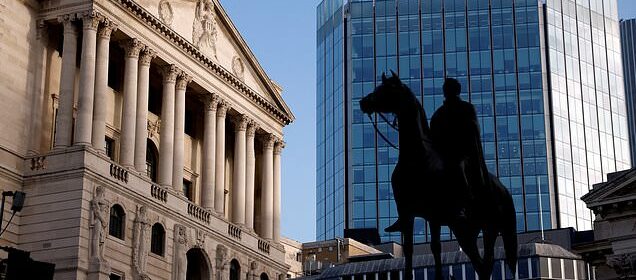DAILY MAIL COMMENT: Clock is ticking on PM's inflation target

DAILY MAIL COMMENT: Clock is ticking on PM’s inflation target
Anyone opening the Office for National Statistics’ inflation report yesterday would have felt a sinking sense of deja vu.
For the second month in a row, consumer prices defied the optimism of most economists and, instead of tumbling into single figures, stayed above 10 per cent.
The slight fall in the rate of inflation was, of course, a modicum of good news – easing the pressure on household budgets.
But with interest rates predicted to reach 5 per cent as the Bank of England tries to cool unexpectedly stubborn inflation, it will hit mortgage holders and businesses who face higher borrowing charges.
(But don’t expect the grasping high street banks to pass on rate rises to poor savers!)
(File Photo) Interest rates are predicted to reach 5 per cent as the Bank of England tries to cool unexpectedly stubborn inflation
With more ambulance workers and hospital staff set to announce strikes, the public sector must be told in no uncertain terms that pay rises must be earned, which means working harder.
Ministers must not capitulate to the unions’ ruinous demands. That would embolden their extremism and risk a 1970s-style wage-price spiral.
While persistently high inflation is partly down to rising food prices, it is also due to Britain’s hugely inflated energy costs.
We are over-reliant on imported fuel and while it was politically expedient for Rishi Sunak to spike Labour’s guns by imposing a harsher windfall tax on oil and gas giants’ profits, this has simply dissuaded those firms from exploiting the vast reserves we have under the North Sea.
The PM has staked his reputation on halving inflation by the end of the year. With the clock ticking, he must pull all the levers at his disposal to hit that goal.
March of the machines
Should we fear the march of the machines? Every major technological advance throughout history, whether it be the invention of the printing press or the splitting of the atom, has prompted a mixture of wonder and dread.
The jury is still out on how concerned humanity should be about the latest industrial revolution – artificial intelligence. AI, which enables computers to make decisions in a more ‘human’ way, could revolutionise the world of work, learning and healthcare – improving people’s lives.
All undoubtedly exciting. But there are potential downsides too: Loss of jobs, an explosion of democracy-damaging fake news, opportunists abusing the technology to expose the public to loss and danger.
And while it may sound the stuff of lurid science fiction, can we be certain AI will not just emulate humans, but outwit them?
Even tech sector luminaries – including Tesla boss Elon Musk – have issued blood-curdling warnings about the rapid development of ever-more powerful artificial minds that even their creators don’t properly understand.
They propose halting research. But this would allow malign nations such as China to take the lead on this epoch-defining technology.
Britain should convene a Cop-style international summit of sensible, freedom-loving governments on AI. By setting early rules, its benefits could be mined and every effort made to ensure this is done safely.
Our role must be to help shape this brave new world responsibly; trying to hold it back is futile.
Don’t spoil King’s day
For more than half a century, King Charles has been an outspoken climate activist, advocating a complete transition from fossil fuels – even before it became a fashionable cause.
So why are Just Stop Oil protesters even thinking about disrupting the coronation of a monarch who preached green virtues long before many of them were born?
The conclusion is obvious: Their imbecilic stunts have nothing to do with saving the planet – and all to do with seeking attention and spoiling the special day for millions.
Source: Read Full Article
